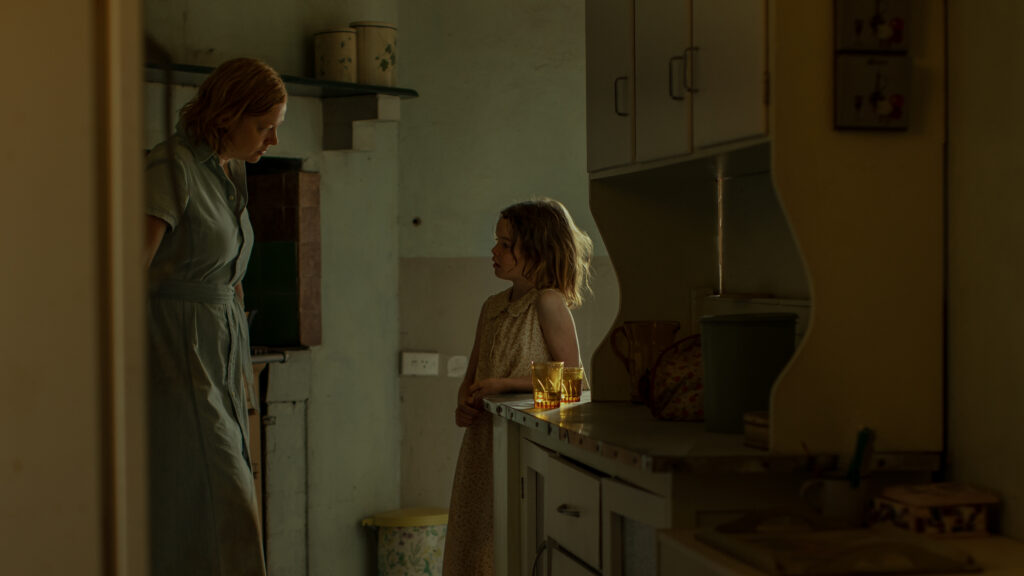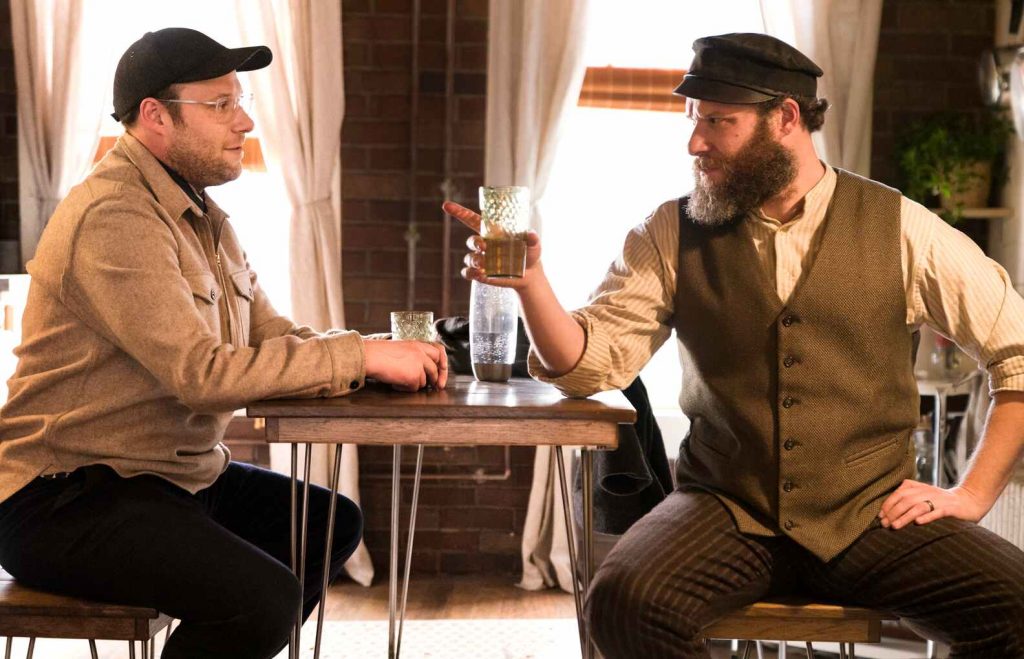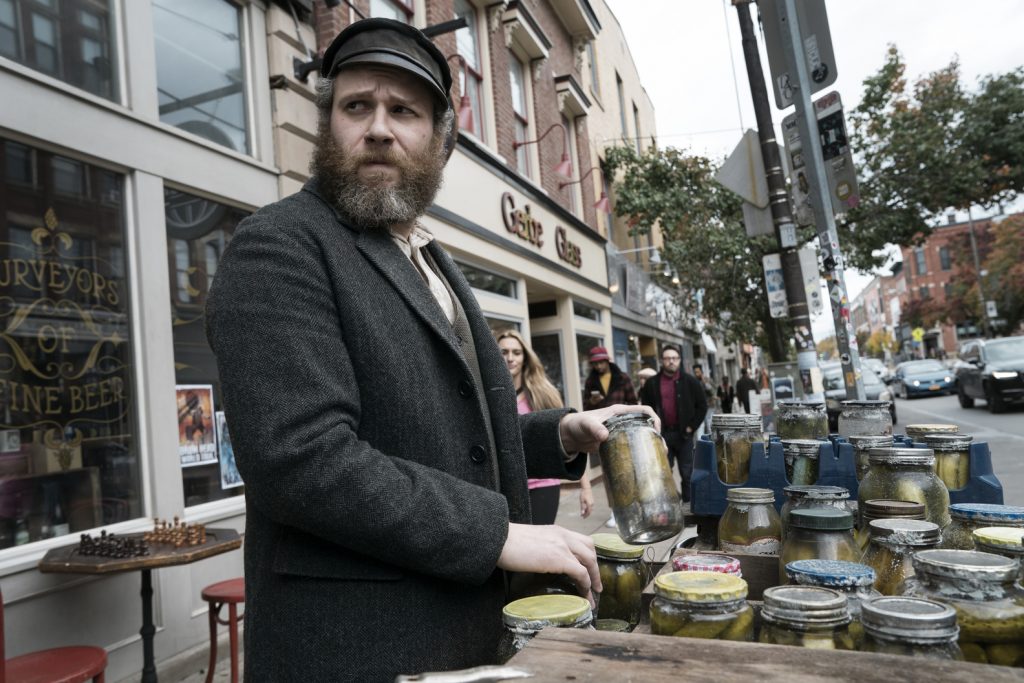July 23, 2023
by Carla Hay

Directed by Daina Reed
Culture Representation: Taking place primarily in Inglemore, Australia, the horror film “Run Rabbit Run” features a predominantly white cast of characters (with a few black people) representing the working-class and middle-class.
Culture Clash: A divorced fertility doctor is disturbed when she finds out that her tween daughter apparently has psychic abilities that involve reincarnation.
Culture Audience: “Run Rabbit Run” will appeal primarily to people who don’t mind watching slow-paced and repetitive horror movies with an obvious storyline.

“Run Rabbit Run” is a very stale and unimaginative horror flick that has repetitive and boring scenes of a mother hallucinating and having a bad temper. The story’s “mystery secret” (revealed at the end) is too easy to solve, so there’s hardly any suspense. The movie’s ending is sure to repulse many viewers and seems to only be in the movie for exploitative shock value, not as a meaningful end to a horror story. “Run Rabbit Run” had its world premiere at the 2023 Sundance Film Festival
Directed by Daina Reed and written by Hannah Kent, “Run Rabbit Run” takes place mostly in Inglemore, Australia, where the movie was filmed on location. A fertility doctor named Sarah Gregory (played by Sarah Snook) is successful in her job, but her personal life has had its share of failures. Sarah is divorced and has primary custody of her daughter Mia (played by Lily LaTorre), who’s about 9 or 10 years old. Sarah and Mia live in a house that’s in a fairly isolated prairie-like area.
Sarah’s only other living relative is her widowed mother Joan (played by Greta Scacchi), who is in a nursing facility. It soon becomes obvious that Sarah despises Joan. Sarah’s animosity for Joan runs so deep, Sarah has not let Joan meet Mia. In the beginning of the movie, Sarah has planned for Mia to have a very small birthday party, but Joan is obviously not invited. Joan has sent a birthday card to Mia, but Sarah has intercepted the card and burned it without Mia knowing about it.
Mia says to Sarah about Joan: “I miss her.” Sarah abruptly replies, “Isn’t it hard to miss someone you’ve never met?” Mia replies, “I miss people I’ve never met all the time.” It’s at ths point you know that Mia has psychic ablities. Sarah later comes home to find Mia playing with a stray rabbit. This rabbit becomes a symbol for Sarah’s past and all the things that Sarah would like to forget about Sarah’s past.
Sarah’s ex-husband Pete (played by Damon Herriman) has moved on to a new relationship. He has a live-in girlfriend Denise (played by Naomi Rukavina), who has a son named Toby (played by Hugo Soysa) from a previous relationship. Toby is about 4 or 5 years old. Pete, Denise and Toby sometimes visit Sarah and Mia, so that Mia can spend time with Pete and hang out with Toby.
Pete, Denise and Toby have arrived for Mia’s birthday party. Sarah gets in a bad mood at the party because Pete tells her privately that he and Denise are trying to have a biological child together. Sarah has told many people over the years that she has only wanted one child. When Sarah and Pete were married, he agreed to this “one child only” decision. Apparently, Sarah expected Pete to feel the same way after they got divorced, but he’s obviously changed his mind.
The other reason why Sarah gets in a bad mood is because Toby hits Mia for no good reason. Sarah loses her temper and says to Toby, “You little shit.” Denise is naturally upset that Sarah has used this abusive language on Toby instead of resolving the problem in a more productive manner. Privately, Pete tells Sarah that he agrees with her about Toby: “He is a little shit.”
“Run Rabbit Run” has these types of scenes that don’t really go anywhere and have horrendous dialogue. Mia doesn’t have any friends, so Mia becomes attached to her new pet rabbit. Her mother Sarah seems to be very jealous of anything or anyone whom Mia might pay attention to more than Mia pays attention to Sarah.
Sarah gets rid of the rabbit by putting the rabbit over a fence, but the rabbit bites Sarah very hard on her left hand before she drops the rabbit. Mia witnesses this incident from a house balcony and is so upset that she runs away from home. Sarah finds Mia hiding in the playground tunnel. Mia is wearing a simple rabbit face mask that Mia has cut out of paper. This rabbit mask is supposed to be a creepy aspect of the movie, but it’s just a dreadfully dull visual gimmick.
It doesn’t take long for Sarah to see more signs that Mia has psychic abilities. And what Mia tells Sarah starts to put Sarah over the edge of sanity. This is where the horror clichés in “Run Rabbit Run” really kick into high gear, such as the over-used horror cliché of “the female who is not believed, and people start to think she’s mentally ill.” Sarah starts to get angry at Mia and accuses her of making up stories, while Sarah might be having her own disconnect with reality.
“Run Rabbit Run” might have worked better as a short film. The movie drags on and on and on, when you just know that Mia’s psychic abilities will inevitably lead to Mia talking to or talking about someone who has died. (It’s not spoiler information, because “Run Rabbit Run” is marketed as a ghost story.) Sarah has obviously got some major issues and big secrets, which are revealed at the end of the film.
The acting in “Run Rabbit Run” is nothing special, unless it’s the highlight of your life to watch Snook portray an annoying character looking miserable in a subpar horror movie. The movie’s weakest links are the lackluster screenplay and bland direction. “Run Rabbit Run” completely misses the point of a horror movie, which is to scare people, not be so boring that viewers will want to go to sleep.
Netflix premiered “Run Rabbit Run” on June 28, 2023.


